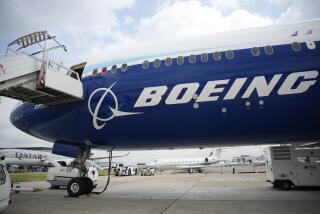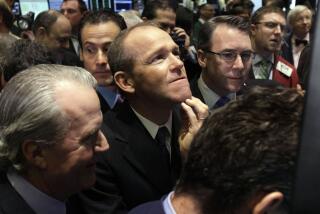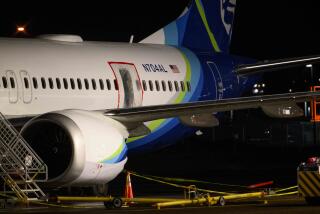Southwest Airlines’ CEO Quits
James F. Parker unexpectedly stepped down as Southwest Airlines’ chief executive Thursday, as the king of low-fare carriers posted a second-quarter profit that fell slightly short of analysts’ forecasts.
Parker, 57, cited unspecified personal reasons for retiring but said his decision wasn’t health-related. He was immediately succeeded by Gary Kelly, 49, who has been chief financial officer of the Dallas-based carrier for 15 years.
The CEO’s job at Southwest is part of a de facto leadership triumvirate that includes Herbert Kelleher, the airline’s legendary co-founder and chairman, and President Colleen Barrett. For that reason, Kelly’s ascension isn’t likely to result in major changes right away, said Michael Allen, chief operating officer of the consulting firm Back Aviation Solutions.
Kelly, who also succeeded Parker as vice chairman, is “an excellent choice for the job,” Allen said. “He’s very intelligent, has leadership experience and has been working side by side with Herb, Jim and Colleen for many, many years.”
Kelly, who learned about his promotion Monday when Kelleher summoned him to a meeting, said in an interview that he was sure his team would make “some changes, but at this point I don’t know what they are. We’re comfortable with the pace we’re growing at right now.”
Southwest, which specializes in cheap fares and short flights, is the busiest operator in the Golden State with 609 daily departures from California cities. About 4,600 of Southwest’s 31,400 employees work in California.
Southwest is the most consistently profitable airline in the business, having reported positive earnings for 53 quarters in a row. Two key reasons: low operating costs and a successful hedging strategy, spearheaded by Kelly, that has limited the effect of surging fuel prices.
Under Parker, Southwest remained healthy while most airlines reeled from a plunge in air travel and losses after the Sept. 11, 2001, terrorist attacks. The airline also expanded into longer-haul markets.
But even Southwest is showing the strains of higher fuel costs, rising labor expenses and stepped-up competition from other discount carriers. Though profitable in the second quarter, its results were “modestly disappointing,” analyst James Higgins of Credit Suisse First Boston said in a note to clients.
After the figures were released, Southwest’s stock fell 31 cents a share, or 2.1%, to $14.75 on the New York Stock Exchange.
Still, most other airlines’ second-quarter results are expected to be worse, with many of the larger, higher-cost airlines again posting losses. The airlines as a group will lose $550 million for the period, analyst Samuel Buttrick of UBS estimated.
Southwest said its net income for the three months ended June 30 was $113 million, or 14 cents a share, down 54% from $246 million, or 30 cents, a year earlier. But the year-earlier period included $271 million ($143 million after taxes) from a federal program to reimburse the airlines for added security costs related to the terrorist attacks and the Iraq war.
Wall Street had expected the airline to earn 16 cents a share, according to analysts surveyed by Thomson First Call.
When Parker succeeded Kelleher as chief executive in mid-2001, Parker was seen as a somewhat interim choice while the carrier groomed younger executives, including Kelly, to take the helm.
But the timing of Parker’s departure, after only three years as chief executive, caught Southwest off guard. “Frankly, we didn’t anticipate that Jim would retire when he did,” Kelleher, 73, said on a conference call with analysts and the media.
On the conference call, Parker said he retired because of “a combination of things.”
He added: “I signed a three-year contract and my contract was up. This is a very exhilarating but draining job. It’s just a logical time to make a change.”
Changes in Southwest’s leadership are notable because the airline’s prosperity is attributed not only to its management and strategy but also to an ability to maintain employees’ fun-loving esprit de corps that’s the envy of most airlines.
That harmony ebbed in recent months, as Southwest’s 7,300 flight attendants complained about stalled contract talks. Parker, who had long been the carrier’s chief labor negotiator, said in April that the talks had become “very personal” and he asked Kelleher to take over the negotiations with Local 556 of the Transport Workers Union.
After reaching a tentative deal last month, Local President Thom McDaniel thanked Kelleher and Barrett for their “hard work,” but made no mention of Parker.
More to Read
Inside the business of entertainment
The Wide Shot brings you news, analysis and insights on everything from streaming wars to production — and what it all means for the future.
You may occasionally receive promotional content from the Los Angeles Times.










